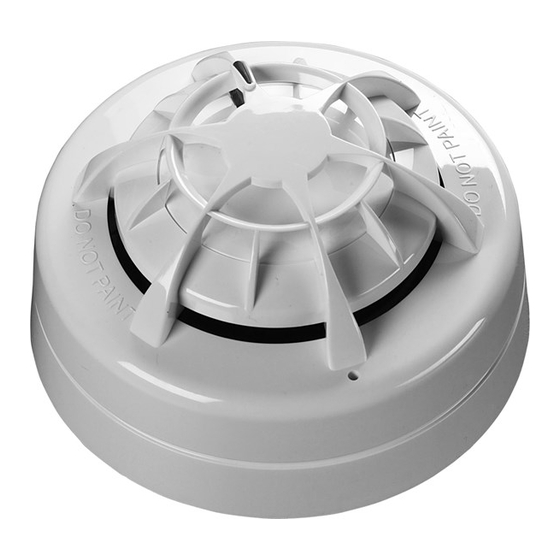Apollo ORB-HT-11001-APO Manual do produto - Página 12
Procurar online ou descarregar pdf Manual do produto para Alarme de fumo Apollo ORB-HT-11001-APO. Apollo ORB-HT-11001-APO 16 páginas. Orbis series
Também para Apollo ORB-HT-11001-APO: Manual do produto (16 páginas), Manual do produto (17 páginas)

- 1. Table of Contents
- 2. Range of Products
- 3. Orbis Optical Smoke Detector
- 4. Environmental Performance
- 5. Orbis Multisensor Smoke Detector
- 6. Technical Data
- 7. Orbis Heat Detector
- 8. Choosing the Correct Class of Heat Detector
- 8. Orbis Timesaver Base
- 8. Orbis Features—Led Status
- 9. Timesaver LX
- 10. Startup
ORBIS
INSTALLING ORBIS
Orbis has been designed to make
installation fast and simple. Fig 4 shows
the TimeSaver mounting base as it is seen
from the installer's point of view.
The E-Z fit fixing holes are shaped to allow
a simple three-step mounting procedure:
12
• Fit two screws to the mounting box
or surface
• Place the Orbis base over the
screws and slide home
• Tighten the screws
The base offers two fixing centres at 51
and 60mm.
A guide on the base interior indicates
the length of cable to be stripped. Five
terminals are provided for the cables,
four being grouped together for ease of
termination.
The terminals are:
• positive IN
• positive OUT
• negative IN and OUT (common
terminal)
• remote LED negative connection
• functional earth (screen)
The terminal screws are captive screws
and will not fall out of the terminals.
The base is supplied with the screws
unscrewed in order to avoid unnecessary
work for the installer.
The end-of-line resistor or active device
should be connected between the OUT+
and COM– terminals.
If it is required that all detectors be fitted
with their LEDs facing the same direction
the bases must be fitted to the ceiling
observing the marking on the exterior
which indicates the position of the LED.
The bases may be connected as shown in
Fig 5 where remote LEDs, if required, are
connected to the associated base.
Fig 6 shows how to connect one remote
LED to more than one base so that an
alarm in any of the detectors connected
will switch the remote LED.
© Apollo Fire Detectors Limited 2004/JDR
© Apollo Fire Detectors Limited 2004/JDR
In many installations bases with diodes
are specified in order that an active end-
of-line device may be fitted. Diode bases
are marked 'OD'. Loop continuity testing
is facilitated as there is a continuity device
in the base. The continuity device enables
power to pass through every base in a loop
to ensure that each is connected correctly.
Once a detector is fitted to the base the
continuity device is automatically locked
permanently open so that the power flows
through the detectors.
FITTING ORBIS
DETECTOR HEADS
When the bases have been installed and
the system wiring tested, the detector
circuits can be populated.
ORBIS
TIMESAvER
BASE®
Part Number ORB-MB-00001-APO
Two methods are suggested:
1. Apply power and fit the detectors one
by one, starting at the base nearest
the panel and working towards the
end of the circuit. As each detector
is powered up it will enter 'StartUp'
and flash red (see next page for a
full description of this feature). If the
LED does not flash, check the wiring
polarity on the base and ensure there
is power across IN+ and COM–. If the
LED is flashing yellow the detector
is not operating correctly and may
require maintenance or replacing
(see DirtAlert and SensAlert® below
and the section 'Maintenance and
servicing' on page 15).
2. Fit all detectors to the circuit, apply
power and check detectors by
observing the LED status of each
device. The StartUp feature lasts for
4 minutes so it may be necessary to
reset or de-power the circuit to allow
all detectors to be observed. The LED
status is the same as method 1.
Marking
Product Description
Orbis TimeSaver Base
Orbis TimeSaver LX Base
Orbis TimeSaver Diode Base
Orbis TimeSaver Relay Base
Savwire Base
TimeSaver Diode Base LX
Orbis LX Base
Orbis Timesaver Base - Deep
Orbis Heater Base
Table 2
Base
Code
OB
OL
OD
OR
OS
DX
XL
EB
HB
